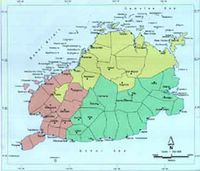Sandugo 2008 emphasized the role of SMEs in the economy
Laying the foundation for globally-competitive SMEs
The Sandugo Regional Product and Raw Material Showcase devoted a day celebrating the role of micro, small and medium enterprises in nation-building and economic development. July 24, 2008 marked the SME DAY for the
Partners from the private sector, national government agencies, German Technical Cooperation (GTZ) came to support the activities. Focusing on SMEDSEP, DTI 7 RD Asteria Caberte presented about SMEDSEP, Mr. Volker Steigerwald, GTZ gave a message on Partnerships, Dr. Elpidio Magante, President, CVSCAFT talked about the SMEDSEP-CVSCAFT Project, Engr. Ramir Bonghanoy, President, Cebu GTH Foundation presented about the SMEDSEP-CVSCAFT-Cebu GTH Foundation Partnership, and Ms. Emilia Roslinda, PROCESS-Bohol presented the SMEDSEP-LRED Project. Signing of Memorandum of Agreements of the following SMEDSEP-CVSCAFT –DTI, SMEDSEP-CVSCAFT-GTH-DTI, SMEDSEP-Abatan River Council-Cong. Chatto –DTI and SMEDSEP-Abatan River LGUs-DTI ensued.
Looking at the Philippine scenario, over 99 percent of business establishments, small and medium enterprises (SMEs) play an important role in the Philippine economy. SME potential for creating jobs is large, yet its growth is hampered by a weak business and investment climate --- low product quality, low productivity and low production technology.
With an improved business and investment climate, SMEs can help in the country’s economic growth by: generating jobs, increasing income and reducing poverty while maintaining an ecologically sound development in all levels.
The Small and Medium Enterprise Development for Sustainable Employment Program (SMEDSEP) is conceived to help improve the business and investment climate for SMEs. This is a project of Technical Cooperation between the Republic of the
Although focusing on the Visayas, SMEDSEP ensures that experiences are communicated to the national level, so that these models for improving the business and investment climate may be promoted and replicated in other regions. Among others, the SMEDSEP program focuses on the harmonization of the National SME Development (SMED) Plan and the Promotion and Replication of Good Practices for Improving the Local Business and Investment.
Towards improving the business climate for SMEs, SMEDSEP promotes: 1. Simplifying Business Registration of LGUs, 2. Local and Regional Economic Development (LRED), 3. Business Development Services(BDS), and 4. SME Access to Credit.
The SMEDSEP in
1. The use of the value chain approach in developing
The value chain approach is a key instrument to foster the competitiveness of SMEs.
DTI – BOHOL, in partnership with the German Technical Cooperation (GTZ) conducted value chain workshops to help producers assess the value chain links in their business and concerned industries.
The priority sectors are: food, craft, and eco-tourism
2. The use of the LRED model to support the LGUs involve in the Abatan River Development Project
Economic Growth Through LRED for the
LRED stands for Local and Regional Economic Development. It is a process for economic growth and employment generation in which the government, non-governmental sector, private, and business partners work collectively to create better conditions and improve the quality of life for all.
The approach is being implemented in the
3. The use of BDS model in the Central Visayas State College of Agriculture, Forestry and Trade (CVSCAFT), and
• BDS stands for Business Development Services. A demand-driven approach, it involves identifying and developing business services that meet the needs of the market. SMEs, for example, face common difficulties of finding adequately-trained skilled workers from the local labor market.
• In the region, there is a growing need for product designers, especially in the GTH or Gifts, Toys and Houseware sector.
• DTI-Bohol seeks to strengthen the local creative industries and taps the ingenuity of Boholanos, having seen the potentials of CVSCAFT graduates in the design industry.
This school year,
CVSCAFT & DTI Bohol officials validated the curriculum of the new course offering at the School of Design and Arts of De la Salle-College of St. Benilde.
4. Support in the upcoming streamlining of Business Permits and Licensing system in LGUs
Streamlining of Business Permits and licensing system of local government units
Investors interested to put up their business establishments in
In a nutshell, that’s how DTI with SMEDSEP helps lay the foundation for a globally-competitive
*****


0 Comments:
Post a Comment
Subscribe to Post Comments [Atom]
<< Home